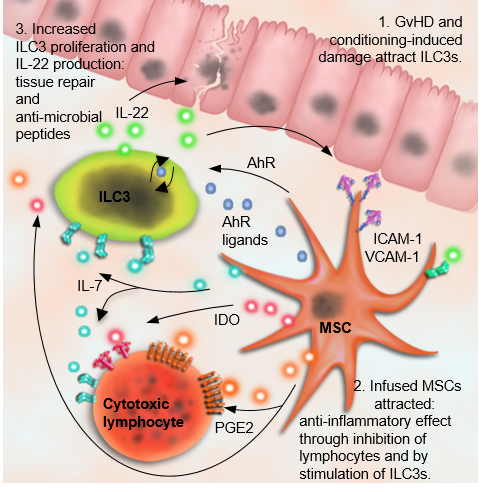MESENCHYMAL STROMAL CELLS STIMULATE THE PROLIFERATION AND IL-22 PRODUCTION BY TYPE 3 INNATE LYMPHOID CELLS
(Abstract release date: 05/18/17)
EHA Library. van Hoeven V. 06/24/17; 181735; S448

Dr. Vera van Hoeven
Contributions
Contributions
Abstract
Abstract: S448
Type: Oral Presentation
Presentation during EHA22: On Saturday, June 24, 2017 from 12:00 - 12:15
Location: Room N104
Background
Infusion of mesenchymal stromal cells (MSCs) is a promising and increasingly applied therapy for patients who suffer from graft-versus-host disease (GvHD), a common and life-threatening complication of allogeneic stem-cell transplantations (ASCT). The therapeutic effect of MSCs is mainly ascribed to their suppression of (alloreactive) lymphocyte proliferation and enhancement of tissue-repair activity. However, only about half of the GvHD patients benefit from MSC therapy, and which factors determine MSC responsiveness is unclear. We recently observed that relatively high frequencies of activated type 3 innate lymphoid cells (ILC3s) before and/or after ASCT were associated with a lower risk to develop GvHD, which may be related to the production of tissue-protective IL-22 by ILC3s.
Aims
To investigate if ILC3s can contribute to the therapeutic effect of MSCs, we studied the interaction between MSCs and ILC3s in vitro.
Methods
ILC3s isolated from human tonsils were CellTrace-labeled and co-cultured with bone-marrow derived MSCs for 5 days in the presence of IL-2.
Results
Co-culture with MSCs significantly enhanced the proliferation of ILC3s and their IL-22 production. Reciprocally, ILC3s promoted ICAM-1 and VCAM-1 expression on MSCs. Transwell experiments revealed that for both directions, the interaction is mainly dependent on cell-cell contact or close proximity of MSCs and ILC3s. Addition of blocking antibodies against ICAM-1, VCAM-1, or their integrin ligands, did not affect ILC3 proliferation, suggesting that ILC3 stimulation is ICAM/VCAM independent. Soluble factors also contributed to the interaction, as ILC3s proliferated slightly better in the presence of MSC culture supernatant compared to IL-2 only. Based on experiments with blocking antibodies, we found IL-7 to be the likely candidate for this effect.

Conclusion
We show that via cell-cell contact and IL-7, MSCs promote the proliferation and IL-22 production by ILC3s in vitro, suggesting ILC3s may play a role in the control of GvHD upon MSC therapy.
Session topic: 21. Stem cell transplantation - Experimental
Keyword(s): Mesenchymal stem cell, Innate Immunity, Graft-versus-host disease (GVHD), Allogeneic hematopoietic stem cell transplant
Abstract: S448
Type: Oral Presentation
Presentation during EHA22: On Saturday, June 24, 2017 from 12:00 - 12:15
Location: Room N104
Background
Infusion of mesenchymal stromal cells (MSCs) is a promising and increasingly applied therapy for patients who suffer from graft-versus-host disease (GvHD), a common and life-threatening complication of allogeneic stem-cell transplantations (ASCT). The therapeutic effect of MSCs is mainly ascribed to their suppression of (alloreactive) lymphocyte proliferation and enhancement of tissue-repair activity. However, only about half of the GvHD patients benefit from MSC therapy, and which factors determine MSC responsiveness is unclear. We recently observed that relatively high frequencies of activated type 3 innate lymphoid cells (ILC3s) before and/or after ASCT were associated with a lower risk to develop GvHD, which may be related to the production of tissue-protective IL-22 by ILC3s.
Aims
To investigate if ILC3s can contribute to the therapeutic effect of MSCs, we studied the interaction between MSCs and ILC3s in vitro.
Methods
ILC3s isolated from human tonsils were CellTrace-labeled and co-cultured with bone-marrow derived MSCs for 5 days in the presence of IL-2.
Results
Co-culture with MSCs significantly enhanced the proliferation of ILC3s and their IL-22 production. Reciprocally, ILC3s promoted ICAM-1 and VCAM-1 expression on MSCs. Transwell experiments revealed that for both directions, the interaction is mainly dependent on cell-cell contact or close proximity of MSCs and ILC3s. Addition of blocking antibodies against ICAM-1, VCAM-1, or their integrin ligands, did not affect ILC3 proliferation, suggesting that ILC3 stimulation is ICAM/VCAM independent. Soluble factors also contributed to the interaction, as ILC3s proliferated slightly better in the presence of MSC culture supernatant compared to IL-2 only. Based on experiments with blocking antibodies, we found IL-7 to be the likely candidate for this effect.

Conclusion
We show that via cell-cell contact and IL-7, MSCs promote the proliferation and IL-22 production by ILC3s in vitro, suggesting ILC3s may play a role in the control of GvHD upon MSC therapy.
Session topic: 21. Stem cell transplantation - Experimental
Keyword(s): Mesenchymal stem cell, Innate Immunity, Graft-versus-host disease (GVHD), Allogeneic hematopoietic stem cell transplant
{{ help_message }}
{{filter}}


